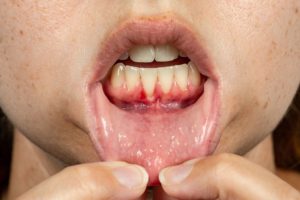 Periodontal (gum) disease is a common dental problem faced by adults. Gum disease can be prevented with proper oral care and hygiene. Early diagnosis of gum disease will result in a better and favourable prognosis. Most people only discover that they have gum disease during a dental visit. Gingivitis is the term used to indicate an early stage of gum disease or inflammation.
Periodontal (gum) disease is a common dental problem faced by adults. Gum disease can be prevented with proper oral care and hygiene. Early diagnosis of gum disease will result in a better and favourable prognosis. Most people only discover that they have gum disease during a dental visit. Gingivitis is the term used to indicate an early stage of gum disease or inflammation.
Symptoms of gum disease
Bacterial infection and other trapped food particles are the most common causes of gum disease. The bacterial buildup will then result in plaque formation. When the plaque formation is left untreated, it will eventually harden and develop into tartar. Toxins are excreted from tartar which destroys and harm the gums. The following are common symptoms of gum disease:
- The gums frequently bleed while flossing or brushing.
- The gums appear to be swollen, and deep red in colour.
- Gum tenderness is frequently experienced.
- Gum tissue destruction leading to loose teeth.
- Prolonged halitosis or bad breath.
- Presence of pus between the gum line and the teeth.
Most people ignore gum bleeding when they brush, however, this is an early indication of gingivitis. Healthy gums are intact and not tender, but when the gums are diseased, they become sensitive and bleed easily with regular brushing. People who notice persistent bleeding of the gums are advised to have a dental checkup to address the gum disease in its early stage.
Periodontal Therapy
For gum disease treatment, dentists will perform a thorough oral examination to assess the health of the gums and other supporting structures of the teeth. The amount of bone that is supporting the teeth will also be examined with the use of a periodontal probe. An x-ray might be requested to determine the nonvisible periodontal condition surrounding the teeth. Inspection of the gums for signs of swelling, inflammation, redness, tenderness, and gum bleeding are checked routinely.
Once the dentist confirms the clinical signs of periodontal disease, they will try to establish the cause of the gum disease. It is vital for the patient to be honest with the dentist, and to mention all dental habits. For gum disease, dentists will use this information to determine its cause. The dentist will also evaluate the stage of the gum disease present in the patient.
Dentists will then formulate a therapy plan to address the individual needs of the patient, depending on the severity of the gum disease. Most dentists will start with dental cleaning as a part of the periodontal therapy. Your dentist will perform a regular cleaning schedule based on the severity of the patient’s gum disease in order to remove the accumulation of bacteria and plaque.
For severe cases of gum disease, dentists will also recontour the affected bone. Antibiotics will be prescribed if deemed necessary.
Dentists can professionally address other concerns regarding gum health. Regular dental checkups are essential for the early detection and treatment of gum disease. Dentists also emphasize that good dental habits such as regular flossing, brushing and dental visits are the best preventive measures against gum disease.
About Dr. Joseph Salvaggio

Located in Brampton, Ontario Dr. Joseph Salvaggio has been practicing general, cosmetic, and implant dentistry for over 20 years. He enjoys interacting with his patients and helping to restore their oral health for better overall health as well. Meeting new patients, interacting and educating them is one of Dr. Salvaggio’s biggest joys. We encourage you to read our reviews or call us with any dental questions you have. We look forward to speaking with you and meeting you soon.
